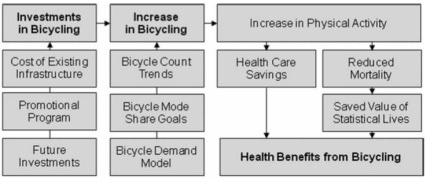
A new research paper published last month in the Journal of Physical Activity and Health focused on how Portland’s investments in bikeways relate to savings in health care costs, fuel purchase savings, and other benefits. The paper (PDF here) sought to monetize the return on investment garnered by the City of Portland for money spent on bikeway miles in the past and what potential returns might be based on projections of future spending.
“By 2040, investments in the range of $138 to $605 million will result in health care cost savings of $388 to $594 million, fuel savings of $143 to $218 million, and savings in value of statistical lives of $7 to $12 billion.”
The paper is authored by Thomas Gotschi, a researcher with the Institute of Social and Preventive Medicine at the University of Zurich in Switzerland.
Here’s a snip from his opening paragraphs (emphasis mine):
“Benefits of bicycling—such as the gain in physical activity and emission-free transportation—are generally understood, at least in broad, qualitative terms, and undisputed. Nonetheless, spending money on bicycle infrastructure is often a low priority compared with investments in roads, public transportation, and other government expenditure. Although traditionally debated within the framework of transportation policies, more recently the idea of considering investments in walking and bicycling as a measure of disease prevention has gained traction… A better understanding of the cost-benefit relationships of bicycling investments would be helpful to justify such initiatives.”
Gotschi’s findings confirm what we already know — that the miniscule investment we have made (and plan to make) in bikeways provides an excellent value for our transportation dollar; particularly in terms of reduced health care costs and fuel savings.
Here is the summary of Gotschi’s findings:
By 2040, investments in the range of $138 to $605 million will result in health care cost savings of $388 to $594 million, fuel savings of $143 to $218 million, and savings in value of statistical lives of $7 to $12 billion. The benefit-cost ratios for health care and fuel savings are between 3.8 and 1.2 to 1, and an order of magnitude larger when value of statistical lives is used.
For some perspective, Portland estimates that all the bikeway infrastructure we have built to date has cost us about $65 million. To analyze the return on investment, Gotschi used the three levels of investment outlined in the 2030 Bike Plan (see Table 1 in his paper). His findings show that at two of the three levels (the “basic” and “80%”), Portland would break even on their bikeway investments by 2015.
In his conclusion, Gotschi notes that this is the first study of its kind and that Portland’s investments in bikeways, “are cost-effective, even when only a limited selection of benefits is considered.”
Read more about the study, and download a copy of it here.
— H/T to the Bicycle Transportation Alliance for bringing this paper to my attention.

